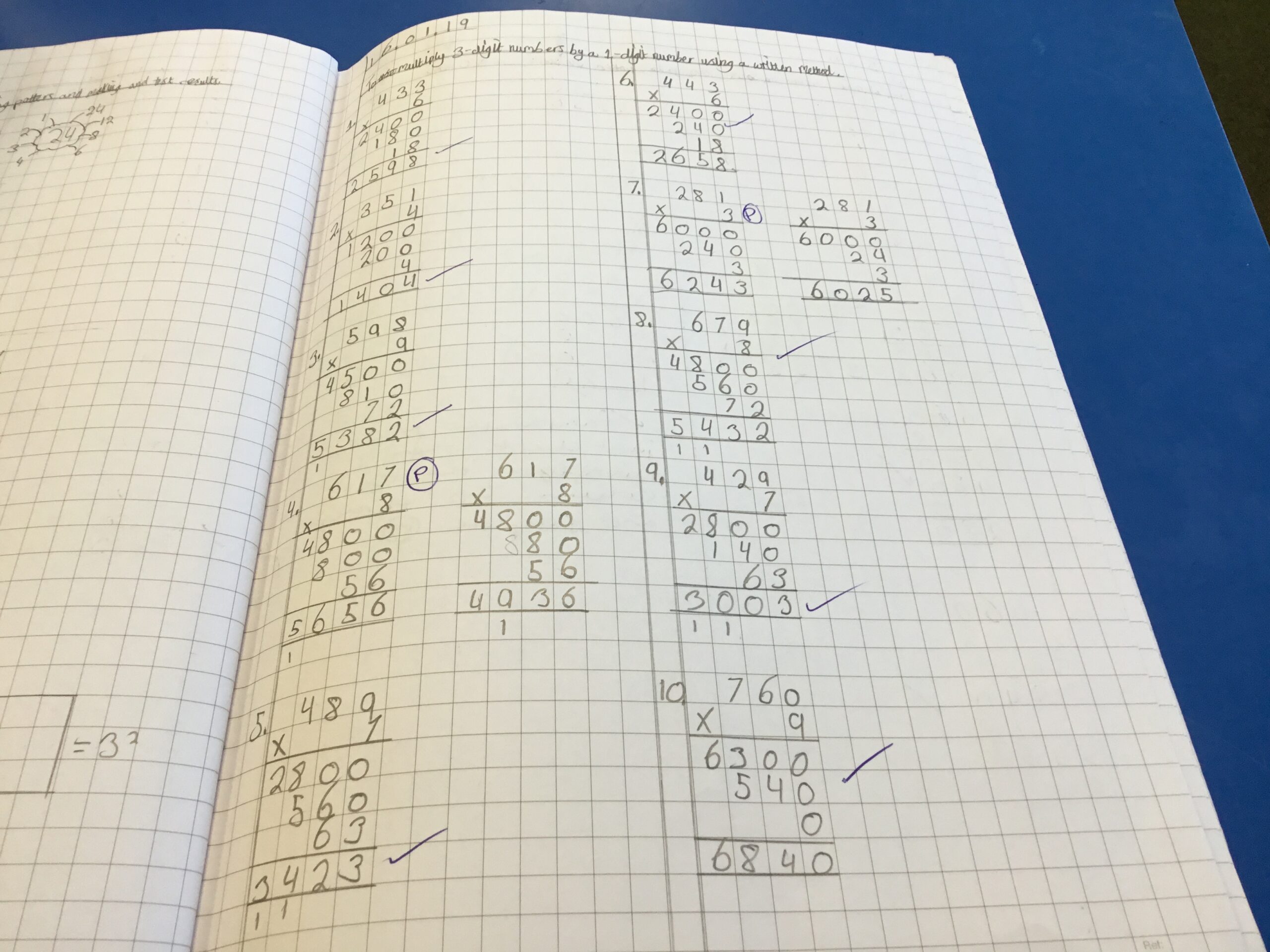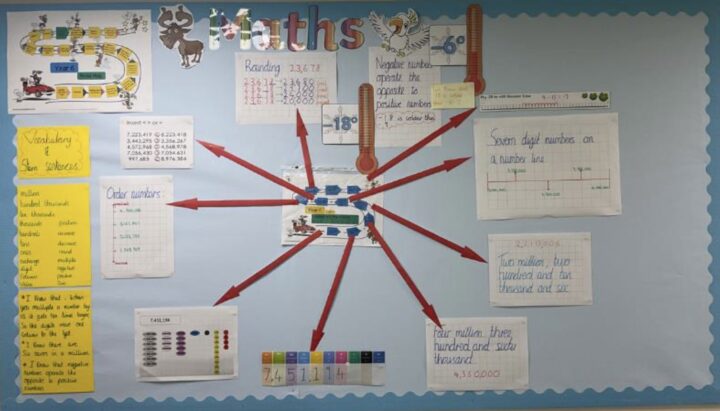Mathematics

Mathematics
At Hill West, we are committed to ensuring that all children are mathematically proficient and confident in the use of maths in their everyday lives. As such we teach for Maths Mastery, designed to ensure all children develop a deep, secure and sustainable understanding of age appropriate mathematical concepts, which can be built upon in the future. We understand that teaching that focuses on developing secure and deep understanding, including the use of practical resources and representations, supports the learning and memorisation of mathematical concepts. We know and believe that all learners can succeed in Maths and support our children to understand that making mistakes is an essential part of learning.

Building on relevant educational research, our maths curriculum has been responsive to the concepts of retrieval practice, interleaving learning and spaced retrieval. We understand that children need regular opportunities to revisit previous learning in order to commit mathematical understanding to the long term memory. As a result, at Hill West, we follow the progressive curriculum suggested by CanDoMaths to ensure that children have regular opportunities to revisit and recall prior learning alongside acquiring new mathematical skills and knowledge through fluency, problem solving and reasoning whilst ensuring all children develop a CanDo attitude to maths.
- Fluency is the first step in becoming a successful mathematician. The National Curriculum states that pupils will: become fluent in the fundamentals of mathematics so that pupils develop conceptual understanding and the ability to recall and apply knowledge rapidly and accurately. In short, pupils should have a secure understanding of mathematical facts to apply to their learning. Contrary to popular belief, fluency in maths is not all about number – there are many more areas of maths which contain facts for children to retain and recall rapidly (for example, having a secure understanding of the properties of shapes).
- Reasoning in maths is the application of logical thinking to make sense of an idea: it enables children to make use of all their other mathematical sense. Justifying and explaining ideas are important aspects of maths.
- Problem solving requires children to think strategically, deciding which steps to take to solve a problem. However, mathematical problems can be presented in a range of ways, not just through wording, and during maths lessons, children develop the strategies to be able to understand problems, decide on a starting point, decide the existing skills they have which they will need to use to solve it, and how to represent their calculations.

CanDoMaths is a dynamic and engaging programme designed to instill a deep love for mathematics and empower children to become confident and capable problem solvers. Through CanDoMaths we follow a structured and effective lesson format to foster curiosity, active learning and mastery of mathematical concepts. Each of our daily, 45 minute, maths lessons are divided into six key phases; The Hook, I Do, We Do, Check, You Do and Review.
Hook: Each CanDo Maths lesson begins with a ‘Hook’ to spark the children’s curiosity and support them to wonder about the key mathematical content for the day. The teacher presents a set of intriguing graphics on the board, encouraging all children to observe, wonder and express their initial thoughts.
I Do: In the ‘I Do’ section of a lesson, the teacher takes on a didactic method, teaching new mathematical content whilst modelling their thinking. This phase is crucial in helping the children understand how a master mathematician would approach various questions, scenarios or problems. The teacher’s clear explanations and demonstrations set the foundation for the children’s learning.
We Do: The ‘We Do’ section of the lesson focuses on collaborative learning. Children work with the teacher to solve a similar problem, allowing them to apply the newly learned concepts.
Check: During the ‘Check’ phase, the children complete a similar question on their whiteboards, showcasing their understanding of the material. The teacher uses formative assessment to gauge every child’s grasp of the concept. This assessment helps the teacher determine which children are ready to proceed independently and which may need additional support.
You Do: The ‘You Do’ phase is the culmination of the lesson and consists of three activities: Do It, Secure It and Deepen It.
- ’Do It’ involves the children tackling both similar and slightly different questions, fostering a comprehensive understanding of What It Is and What It Is Not.
- ’Secure It’ activities present common misconceptions through the character, Colin the CanDo Carabou. The children identify what Colin did wrong, explain his mistake and offer advice for improvement. This activity helps the children confront and rectify misconceptions.
- ’Deepen It’ tasks the children with thinking critically and solving problems in various ways alongside Coco the CanDo Cockatoo. They may also determine whether a given statement is, ‘Always, Sometimes or Never true,’ encouraging them to think deeply and the content and its application.

Review: In the review section of our CanDo Maths lessons, we ensure that the children have a firm grasp of the newly acquired knowledge. Here the children are presented with a multiple-choice question that challenges them to apply their understanding of the lessons concepts. This phase serves as a final check to assess every child’s comprehension and ability to make informed choices based on the learning.
When we plan lessons and sequences of lessons, learning is structured so that all pupils work through new content together as a whole group. Although we do not differentiate the learning by reducing the level of difficulty for certain groups, the questioning and scaffolding that individual children receive in class will differ. Tasks are set for all children of similar difficulty as the expectation is that “the majority of pupils will move through the programmes of study at broadly the same pace” (National Curriculum, 2014). Teachers allow time for children to fully understand, explore and apply ideas, rather than accelerate through new topics. Pupils’ difficulties and misconceptions are identified through immediate formative assessment and addressed with rapid intervention. This approach enables pupils to truly grasp a concept.
All children are supported in lessons by having the opportunity to make use of a range of resources, ensuring concrete, pictorial and abstract methods are accessible to all.
- Concrete – Students should have the opportunity to use concrete objects and manipulatives (for example, cubes or base ten) to help them understand and explain what they are exploring.
- Pictorial – Students should then build on this concrete approach by using pictorial representations (for example the bar model to represent addition or subtraction). These representations can then be used to reason and solve problems.
- Abstract – With the foundations firmly laid, students should be able to move to an abstract approach using numbers and key concepts with confidence (for example, formal written methods).
Maths on Track Meetings (MOTs)
In addition to the daily CanDo Maths lessons, our maths curriculum features a crucial element known as ‘Maths on Track’ meetings (MOTs). This distinctive, 30 minute, daily session provides an invaluable opportunity for our children to consolidate their mathematical learning, ensuring they stay on course for Mastery in Mathematics.
Key objectives for ‘Maths on Track’ meetings:
- Practice and Application: The ‘Maths on Track’ sessions offer our children a chance to actively practice the content covered in the day’s CanDo Maths lesson. Through a variety of exercises and problems, the children apply their newfound knowledge, developing confidence and competence in their mathematical abilities.
- Skill Retreival: In these sessions, the children revisit skills and knowledge acquired in previous lessons and from across the curriculum. This regular reinforcement of concepts not only reinforces their learning but also helps build a strong foundation for future mathematical challenges.
- Support: For children who have found the taught content in the CanDo Maths lessons particularly challenging, our ‘Maths on Track’ meetings provide an invaluable opportunity to gain additional support. Our dedicated teachers are on hand to offer one-to-one / group assistance, clarification and guidance to ensure that every child, ‘keeps up’.
‘Maths on Track’ meetings are designed to be more than just an extension of the regular curriculum. They play a pivotal role in helping our children connect their mathematical knowledge, developing a comprehensive understanding of the subject and building strong conceptual frameworks. These sessions encourage the children to actively engage with the material, enhancing their retention and comprehension. Additionally, the individualised support for those that require it, ensures that everyone receives the help they need to excel in maths.
The MOT Meetings are planned to be flexible and take place daily where arithmetic skills are revisited and embedded, content can be pre-taught, key number facts are recalled and secured and where all children take part in deliberate practice of current or previous learning.
Day 1 and day 2 – Arithmetic
Day 3 and 4 – Deliberate Practice of current and previous learning
Day 5 – Fact Friday
At Hill West, ‘Maths on Track’ is not just an added feature, it’s an integral part of our commitment to nurturing mathematical excellence. These sessions help to provide our children with a comprehensive and well-rounded mathematical education, equipping them with the skills and confidence to excel in a world of numbers.
Working Walls

Working walls in each of our classrooms are centred on empowerment, giving our children the tools they require to succeed in their mathematical education. They offer a visual and functional support system that ensures every child remains on track, grows in confidence and competence and continues to develop independence. Children can be reminded of what they have learnt, see good models of how to do something or what they are aiming for and find useful vocabulary.
Progression and Retrieval: Our working walls are a visual testament to the progress and mathematical growth of our children. They provide a comprehensive view of their learning progression in mathematics, showcasing the various stages and milestones that the children achieve throughout each unit and across the academic year. These working walls offer our children the opportunity to retrieve key knowledge, fostering a strong sense of continuity and understanding.
Building Vocabulary: Clear and concise vocabulary is a cornerstone of effective mathematics learning. Our working walls display prominently, the terms and phrases that are essential for the current unit. This not only builds the children’s mathematical vocabulary but also ensures they have a strong grasp of the language of mathematics, enabling every child to articulate and communicate their understanding with confidence.
Supportive Stem Sentences: Incorporating mathematical terminology into sentences is crucial for a comprehensive understanding of the subject. To support each child, our working walls include stem sentences that guide them in using the correct mathematical terminology when answering questions. This support empowers our children to respond thoughtfully and coherently, enhancing their communication and problem-solving skills.
The Road Map: Our working walls offer a yearly ‘road map’ that guides our children throughout the academic year. This comprehensive overview illustrates the manageable steps (lessons) that each unit is divided into, providing a clear understanding of the journey the children will embark on over the course of the year. With this ‘Road Map’, the children gain a sense of the bigger picture and can see how the individual units fit into their overall mathematical education.
Teaching Multiplication
Fluency comes from deep knowledge and practice. At early stages, explicit teaching of multiplication tables is important in the journey towards fluency and contributes to quick and efficient mental calculation. At Hill West, we teach multiplication both through progressive teaching sequences (beginning in Year One) and through daily multiplication chanting and recall of the times tables appropriate for each year group.
Early Mathematics
An engaging and encouraging climate for children’s early encounters with mathematics develops their confidence in their ability to understand and use maths. These positive experiences help children to develop dispositions such as curiosity, imagination, flexibility, inventiveness and persistence, which contribute to their future success in and out of school (Clements & Conference Working Group, 2004).

At Hill West, we are passionate about the teaching of early mathematics. We actively introduce mathematical concepts, methods and language through a variety of engaging and stimulating practical experiences. We guide children to see connections of ideas within mathematics as well with other subjects, developing their mathematical knowledge throughout the day and across the curriculum. We encourage children to communicate, explaining their thinking as they interact with mathematics in deep and sustained ways.
We ensure that children have sufficient practice to be confident in using and understanding numbers which provides a strong basis for more complex learning later on. Focus is placed on the use of concrete resources to develop deep structural knowledge and the ability to make connections, with the aim of ensuring that what is learnt is sustained over time.

